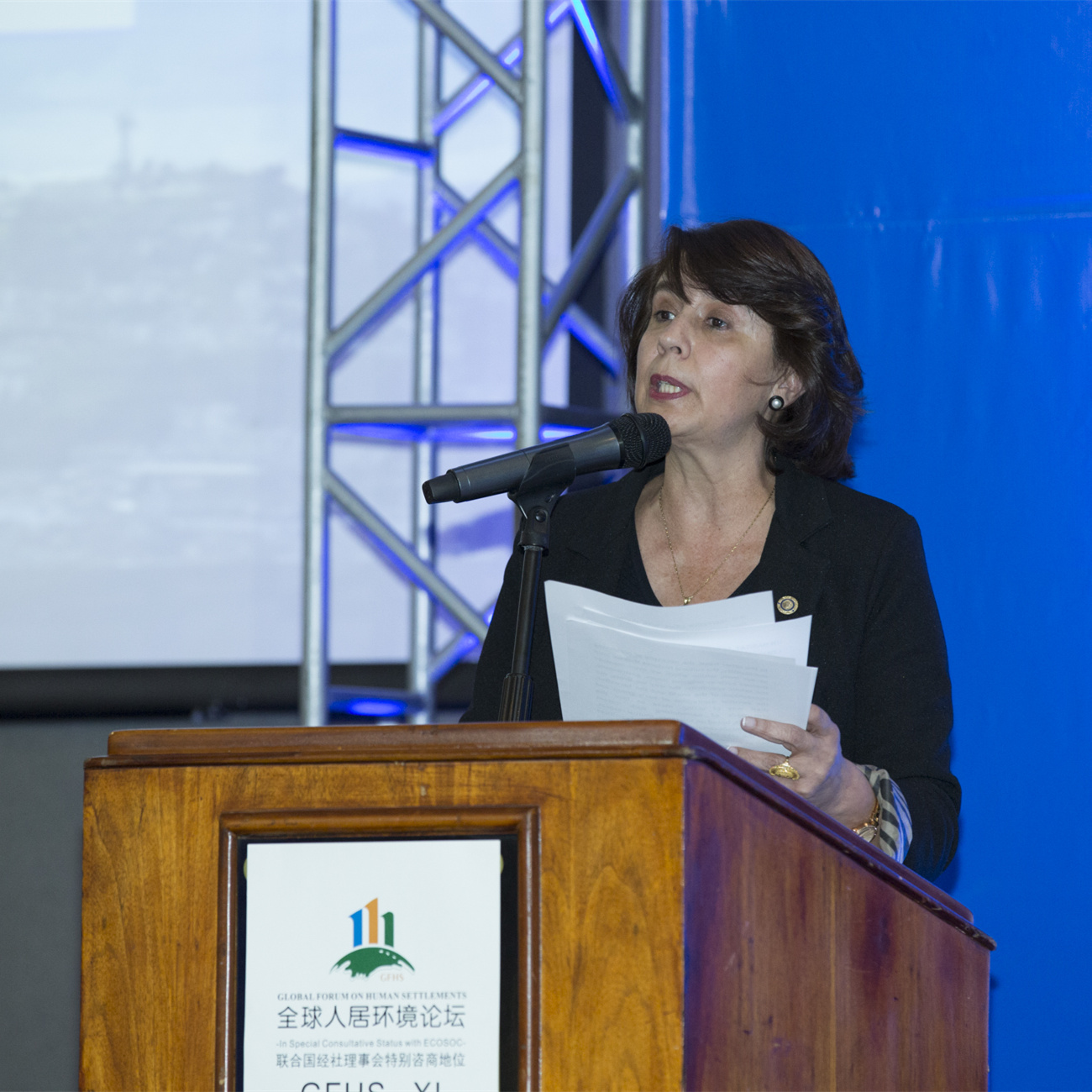


Committed to Sustainable Cities and Human Settlements for All

In Special Consultative Status with ECOSOC
Search
NameDescriptionContent
Home>>Text
H.E. Rosalia Arteaga Serrano: The GLOCAL citizens Concept
Source:
|
Author:gfhsforum
|
Published time: 2017-01-11
|
1069 Views
|
Share:

H.E. Rosalia Arteaga Serrano, Former President of Ecuador
A planet with one of the densest population and urbanization rates of the whole history of humanity, a human being that has shown it can reach the highest peaks of knowledge, but also of inequity. In the middle of the advances and undeniable globalization, provable through the economy, the science, the communication, the environment, we cannot leave apart and unattended the human individuality, themes like identity, the being of the people, the local, which is what it really matters for the citizens of the world.
Therefore, in this high forum within the Habitat summit in Quito, knowing that we are addressing to a large group of entrepreneurs and business men, I invite you to think about the concept of GLOCAL, a lexicographical neologism, which includes a new concept of life that has much to do with the theme of this particular meeting, “Compact sustainable city offers a better life,” because we are referring to quality of life in compact and sustainable cities, meaning by this that primarily serve the needs of the inhabitants of the city: women, children, men, elderly, youth, and disabled, all eager to improve or maintain their quality of life, in a spirit of solidarity, commitment, and tolerance.
We are GLOCAL citizens, defined like this because we are those who make use of the latest technologies, we communicate with the high speed of the most sophisticated elements that every day are renewed, which presents us with new challenges and learning. We feel that the planet is our big home, that we must take care of and protect, if we want to continue living as a human race, as a species, amid the cataclysms that causes our own actions, we know that what we do in a particular place on the planet ultimately affects and impacts on more distant and unimaginable places, such as if we hit the large reserve of biodiversity that exists in the continental Amazon, the effects will be felt in the planet's climate. We also know that decisions and economic causes to be taken in such a huge country like China, affect the total global economy.
The needs of ones are the complement of the others, in that perspective, a giant as China, could see in a small but megadiverse country like Ecuador, the complementation possibility due to its diversity and enviable geographic situation right in the middle of the world that passes through the Andean mountain range and it is touched with the same Pacific Ocean that touches the Chinese coast.
In the other hand, the necessity of preserving our identity, the cultural features that we hold as our own, within which we even mention themes such as religious issues, gastronomy, the ethnic specificity, the way we dress, our conceptions of the world and the hereafter, the peculiar aspirations of each group and their way of acting, make us face the crossroads of harmonizing such distant concepts, based on tolerance, mutual respect, which entails certain disclaimers and sacrifices for the sake of the common good as human beings aspire.
Because of the GLOCAL concept, it will become more achievable with regards to what we want to accomplish in this wonderful and complex world that we inhabit, with so many interests and necessities that converge, which make us think in the circularity of the world, in the necessity of respecting others and our surroundings, building more friendly, livable, less aggressive cities, with the quality of life that we aspire for ourselves and our similar ones.
The way to do it is already designed. It is through the 17 Sustainable Development Goals, which give us the work structure and solid targets to reach the future we want. Regarding to cities, urban-focused goal 11 “Make cities inclusive, safe, resilient and sustainable”, defines our path to work in concrete actions that enable us to have cities with basic services, housing, reachable transport, and equal opportunities for everybody.
There are those who say that past times were better, I dare to think, that if sustainability principles such as, solidarity, tolerance, worrying about world peace, but also for the mind peace and of the heart of each one of us are applied, we can say that all future times will be better.
Therefore, in this high forum within the Habitat summit in Quito, knowing that we are addressing to a large group of entrepreneurs and business men, I invite you to think about the concept of GLOCAL, a lexicographical neologism, which includes a new concept of life that has much to do with the theme of this particular meeting, “Compact sustainable city offers a better life,” because we are referring to quality of life in compact and sustainable cities, meaning by this that primarily serve the needs of the inhabitants of the city: women, children, men, elderly, youth, and disabled, all eager to improve or maintain their quality of life, in a spirit of solidarity, commitment, and tolerance.
We are GLOCAL citizens, defined like this because we are those who make use of the latest technologies, we communicate with the high speed of the most sophisticated elements that every day are renewed, which presents us with new challenges and learning. We feel that the planet is our big home, that we must take care of and protect, if we want to continue living as a human race, as a species, amid the cataclysms that causes our own actions, we know that what we do in a particular place on the planet ultimately affects and impacts on more distant and unimaginable places, such as if we hit the large reserve of biodiversity that exists in the continental Amazon, the effects will be felt in the planet's climate. We also know that decisions and economic causes to be taken in such a huge country like China, affect the total global economy.
The needs of ones are the complement of the others, in that perspective, a giant as China, could see in a small but megadiverse country like Ecuador, the complementation possibility due to its diversity and enviable geographic situation right in the middle of the world that passes through the Andean mountain range and it is touched with the same Pacific Ocean that touches the Chinese coast.
In the other hand, the necessity of preserving our identity, the cultural features that we hold as our own, within which we even mention themes such as religious issues, gastronomy, the ethnic specificity, the way we dress, our conceptions of the world and the hereafter, the peculiar aspirations of each group and their way of acting, make us face the crossroads of harmonizing such distant concepts, based on tolerance, mutual respect, which entails certain disclaimers and sacrifices for the sake of the common good as human beings aspire.
Because of the GLOCAL concept, it will become more achievable with regards to what we want to accomplish in this wonderful and complex world that we inhabit, with so many interests and necessities that converge, which make us think in the circularity of the world, in the necessity of respecting others and our surroundings, building more friendly, livable, less aggressive cities, with the quality of life that we aspire for ourselves and our similar ones.
The way to do it is already designed. It is through the 17 Sustainable Development Goals, which give us the work structure and solid targets to reach the future we want. Regarding to cities, urban-focused goal 11 “Make cities inclusive, safe, resilient and sustainable”, defines our path to work in concrete actions that enable us to have cities with basic services, housing, reachable transport, and equal opportunities for everybody.
There are those who say that past times were better, I dare to think, that if sustainability principles such as, solidarity, tolerance, worrying about world peace, but also for the mind peace and of the heart of each one of us are applied, we can say that all future times will be better.
Copyright © Global Forum on Human Settlements (GFHS)
